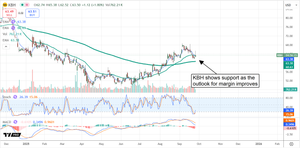
The Beauty Tech Group, a rapidly expanding force in the at-home beauty device market, is poised for its highly anticipated stock market debut on the London Stock Exchange (LSE) in October. With a target valuation ranging from £280 million to £320 million, this initial public offering (IPO) is being hailed as a crucial moment for London's beleaguered listings market, offering a much-needed injection of optimism and a significant test of investor appetite in the autumn IPO window.
This strategic move by the Beauty Tech Group, parent company of popular brands like CurrentBody, ZIIP Beauty, and Tria Laser, not only underscores the burgeoning potential of the beauty technology sector but also provides a rare scale-up success story for the UK capital markets. Its successful flotation could pave the way for other companies considering a London listing, potentially reversing a trend of muted IPO activity and companies opting for overseas exchanges.
A New Glow for London: Beauty Tech Group's Debut and Its Significance
The Beauty Tech Group, operating under its parent entity Project Glow Topco Limited, announced its intention to float in early September 2025, with a registration document published around the 7th-8th. The company has set a share price range of 251 pence to 291 pence per share, aiming for a market capitalization of approximately £280 million to £320 million. This figure is a slight adjustment from earlier estimations that had touched £350 million, reflecting a measured approach to market entry. The IPO will see the issuance of roughly 11.6 million new shares, designed to raise around £29 million. This capital is earmarked primarily for debt reduction, ensuring the company is debt-free post-IPO, and for bolstering its working capital to fuel future growth initiatives. Additionally, up to 29.3 million existing shares will be sold by current shareholders, with a commitment that at least 25% of the company's shares will be available to institutional and retail investors.
The first day of trading on the London Stock Exchange's main market is anticipated to be in October 2025. Key players facilitating this landmark event include Berenberg, serving as the sponsor, bookrunner, and financial adviser, alongside N.M. Rothschild & Sons Ltd (Rothschild & Co), also acting as a joint financial adviser. Legal counsel is being provided by Addleshaw Goddard LLP for Project Glow Topco and Travers Smith LLP for Berenberg. Leadership includes co-founders CEO Laurence Newman and CTO Andrew Showman, who established CurrentBody.com in 2009, with Sam Glynn as the finance chief and Elaine O'Donnell, former chairwoman of Games Workshop (LSE: GAW), appointed as the non-executive chairwoman. Major investor Thakral Corporation (SGX: A09) holds a significant 9.32% effective interest in the parent company. The market's initial reaction has been largely positive, viewing the IPO as a much-needed shot in the arm for the London market, which has struggled with a dearth of new listings and a series of high-profile companies either delisting or choosing other global exchanges.
Shifting Sands: How Beauty Tech Group's IPO Might Reshape the Market
The Beauty Tech Group's IPO is poised to send ripples across both the beauty and technology sectors, influencing market dynamics and investor sentiment. For the broader beauty market, this listing underscores the accelerated growth of the global at-home beauty device (AHBD) segment, valued between £9 billion and £12 billion, within the colossal £464 billion global beauty and personal care industry. A successful debut could significantly elevate the profile of AHBDs, driving further consumer adoption and investment into this innovative niche. It validates the shift towards professional-grade treatments accessible from home, a trend that has gained considerable momentum.
In the technology market, the IPO highlights the increasing convergence of beauty and tech. The Beauty Tech Group's reliance on cutting-edge technologies like LED, radio frequency, microcurrent, and laser treatments demonstrates how innovation is disrupting traditional beauty paradigms. A strong performance could encourage more venture capital and private equity investment into consumer health and beauty technology, fostering further innovation and competition. Companies that embrace this technological integration are likely to thrive, while those clinging to conventional models may find themselves falling behind. The IPO serves as a bellwether for investor confidence in tech-driven consumer brands within the UK.
Potential winners from this IPO include other companies operating within the at-home beauty device market, as the Beauty Tech Group's success could validate the sector and attract broader investor interest. The London Stock Exchange (LSE) itself stands to gain significantly, as a successful listing could act as a catalyst, encouraging other high-growth companies to consider floating in the UK, thereby revitalizing the exchange's attractiveness. Investors seeking growth opportunities in the intersection of consumer tech, beauty, and wellness will find a new, prominent player in the market. Conversely, direct competitors to Beauty Tech Group's brands, such as other manufacturers of LED masks, microcurrent devices, or at-home laser hair removal systems, may face heightened competition from a newly capitalized and high-profile rival. Furthermore, traditional beauty companies that are slow to adapt to technological advancements or expand into the D2C (Direct-to-Consumer) model might experience increased pressure on their market share and profitability as tech-focused disruptors gain traction.
Broader Implications: Redefining Beauty and Investment Landscapes
The Beauty Tech Group's IPO is more than just a company going public; it's a powerful affirmation of several overarching industry trends. Firstly, it champions the democratization of professional treatments, making advanced skincare and beauty solutions previously confined to clinics now accessible in consumers' homes. This shift is driven by the demand for convenience, efficacy, and personalized beauty routines, and the Beauty Tech Group's portfolio of clinically proven devices directly addresses this. Secondly, the company's digitally native, D2C model, with over 90% of its 2024 revenue from e-commerce and products sold in over 90 countries, underscores the critical importance of a robust global digital strategy in today's consumer market. This model allows for direct engagement with customers, faster product iterations, and efficient international expansion, setting a benchmark for others in the industry.
Thirdly, the Beauty Tech Group's strategic evolution, moving to exclusively sell its own-brand products since 2019 and acquiring key brands like ZIIP Beauty (2022) and Tria Laser (2024), highlights a trend towards vertical integration and market consolidation within the beauty tech space. This strategy allows for greater control over product development, supply chain, and brand messaging, fostering a stronger competitive advantage. The IPO's success could inspire similar consolidation efforts and strategic acquisitions across the industry as companies seek to build comprehensive beauty tech ecosystems. Historically, successful IPOs in emerging tech sectors often lead to a surge in investment and M&A activity, and the beauty tech space is unlikely to be an exception.
While specific regulatory impacts were not detailed in the research, the increasing sophistication and professional-grade claims of at-home beauty devices naturally invite greater scrutiny from regulatory bodies. Companies in this sector, including the Beauty Tech Group, will likely face evolving standards regarding product safety, efficacy substantiation, and marketing claims. The company's emphasis on "research and rigorous testing" to ensure effective and trustworthy products, aiming to "raise the standards across the industry," suggests a proactive approach to potential regulatory challenges. This focus on verifiable results and consumer trust will be paramount for sustained success and could influence future industry-wide best practices and regulatory frameworks.
What's Next: Navigating the Evolving Beauty Tech Frontier
Looking ahead, the Beauty Tech Group's IPO marks a significant inflection point, with both short-term and long-term possibilities shaping its trajectory and the wider market. In the short term, the immediate focus will be on the stock's performance post-listing. A strong debut and sustained investor confidence could provide the company with additional capital-raising opportunities and enhance its brand visibility, potentially accelerating its global expansion plans and product development pipeline. Conversely, any volatility could temper immediate growth ambitions and impact investor sentiment towards other upcoming tech IPOs in London.
In the long term, the Beauty Tech Group will need to continue demonstrating innovation and market leadership to maintain its competitive edge. This may involve strategic pivots, such as further acquisitions to expand its brand portfolio, investments in new technological frontiers (e.g., AI-powered personalized beauty, biotech integration), or deepening its presence in key international markets. The company's ability to adapt to rapidly evolving consumer preferences and technological advancements will be crucial. Market opportunities may emerge in untapped geographic regions or in developing synergistic product lines that integrate with its existing device ecosystem. Challenges could include intensified competition from both established beauty giants entering the tech space and new agile startups, as well as navigating complex international regulatory landscapes.
Potential scenarios range from the Beauty Tech Group becoming a dominant global player in the at-home beauty device market, driving significant consolidation and innovation, to facing increased pressure from well-funded competitors. Its success could serve as a blueprint for other D2C, tech-enabled consumer brands seeking public markets, particularly in the UK. Investors will be keenly watching how the company leverages its newly acquired capital, its performance against financial targets, and its strategic moves in product innovation and market expansion. The outcomes will not only determine the Beauty Tech Group's future but also provide valuable insights into the resilience and growth potential of the London Stock Exchange as a destination for tech-driven IPOs.
Conclusion: A New Chapter for Beauty and Capital Markets
The Beauty Tech Group's upcoming stock market debut represents a pivotal moment for both the burgeoning beauty technology sector and the London Stock Exchange. Key takeaways from this event underscore the accelerating trend of professional beauty treatments moving into the home, the undeniable power of the direct-to-consumer model, and the strategic importance of innovation and brand consolidation in a rapidly evolving market. The IPO's success is poised to provide a much-needed boost to London's capital markets, signaling renewed investor confidence in UK-listed growth companies.
Moving forward, the market will assess how the Beauty Tech Group utilizes its fresh capital to fuel innovation, expand its global footprint, and fend off increasing competition. Its performance will serve as a crucial indicator for the health and direction of the at-home beauty device market, influencing investment decisions and strategic planning across the broader beauty and tech industries. Investors should closely monitor the company's post-IPO growth metrics, its ability to integrate new technologies, and its strategic responses to market shifts and regulatory developments in the coming months. The Beauty Tech Group's journey will not only shape its own destiny but also contribute significantly to defining the future landscape of beauty and consumer technology.
This content is intended for informational purposes only and is not financial advice





